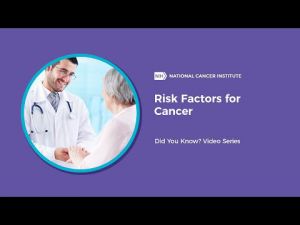About-cancer/causes-prevention/risk/zh
癌症的危險因素
通常不可能確切地知道一個人為什麼會患癌症而另一個人卻不會。 但是研究表明,某些危險因素可能會增加一個人患癌症的機會。 (也有一些因素與較低的癌症風險有關。這些因素有時被稱為保護性危險因素,或僅僅是保護性因素)。
癌症的危險因素包括接觸化學物質或其他物質,以及某些行為。 它們還包括人們無法控制的事物,例如年齡和家族史。 某些癌症的家族病史可能是可能遺傳的癌症綜合症的徵兆。 (有關可導致癌症的遺傳遺傳突變的更多信息,請參見「遺傳性癌症綜合徵」部分)。
Most cancer risk (and protective) factors are initially identified in epidemiology studies. In these studies, scientists look at large groups of people and compare those who develop cancer with those who don’t. These studies may show that the people who develop cancer are more or less likely to behave in certain ways or to be exposed to certain substances than those who do not develop cancer.
Such studies, on their own, cannot prove that a behavior or substance causes cancer. For example, the finding could be a result of chance, or the true risk factor could be something other than the suspected risk factor. But findings of this type sometimes get attention in the media, and this can lead to wrong ideas about how cancer starts and spreads. (See the Common Cancer Myths and Misconceptions page for more information.)
When many studies all point to a similar association between a potential risk factor and an increased risk of cancer, and when a possible mechanism exists that could explain how the risk factor could actually cause cancer, scientists can be more confident about the relationship between the two.
The list below includes the most-studied known or suspected risk factors for cancer. Although some of these risk factors can be avoided, others—such as growing older—cannot. Limiting your exposure to avoidable risk factors may lower your risk of developing certain cancers.
- Age
- Alcohol
- Cancer-Causing Substances
- Chronic Inflammation
- Diet
- Hormones
- Immunosuppression
- Infectious Agents
- Obesity
- Radiation
- Sunlight
- Tobacco
Related Resources
Cancer Prevention Overview (PDQ®)–Patient Version
